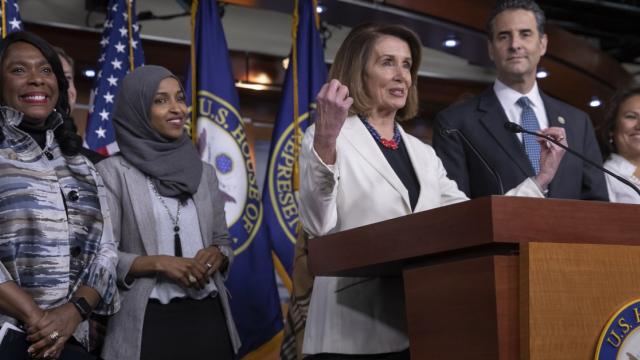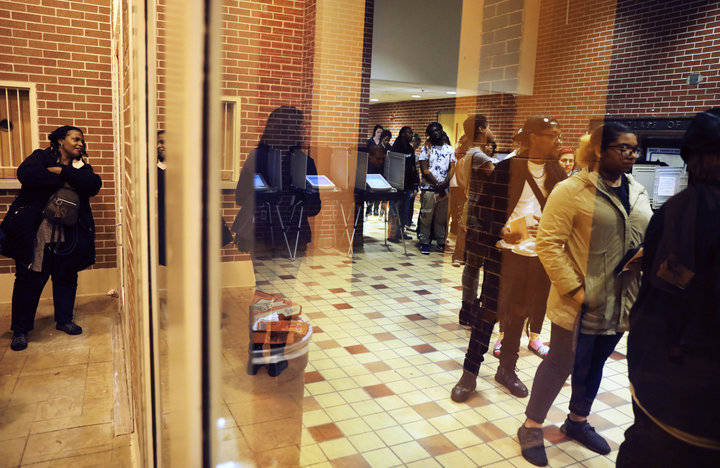
House Democrats unveiled Friday the For the People Act, a comprehensive package of democratic reforms and the first major bill of the 116th Congress. The bill is a sweeping combination of election, campaign finance and ethics reforms designed to make voting easier, curb the power of big donors and reduce conflicts of interest in all three branches of government.
The For the People Act was the first major legislative action for Democrats after they voted to end the partial government shutdown initiated by President Donald Trump, a measure he is expected to veto.
The package of reforms was put together in a collaborative process initiated by House Speaker Nancy Pelosi in 2011 and overseen by Rep. John Sarbanes since 2017. The party ran in the 2018 midterm elections on a promise to enact these reforms.
“We carried a message of reform, of fighting corruption, of cleaning up Washington,” Sarbanes said in introducing the bill on Friday. “We made a promise to the American people. The new members who’ve come made that promise and made it clear they wanted this to be the first order of business. [This bill] is delivering on that promise.”
The reforms in the For the People Act would restore the right to vote to millions of disenfranchised Americans and make it dramatically easier for people to vote while also creating a first-of-its-kind public financing system for House elections. It would also require presidential candidates to disclose 10 years of their tax returns.
The bill shortly will go to three committees ― administration, judiciary and oversight ― for hearings. Democrats hope to pass it through the full House in February.
It will then go to the Senate, where a companion bill will be introduced soon. Senate Majority Leader Mitch McConnell, a hard-line opponent of campaign finance and election reforms, promised that the bill will not get a vote.
“The American people will know that this is an option that the House has given the Senate of the United States and the president of the United States,” Pelosi said on Friday.
Here is what is in the Democrats’ big reform bill:
Election reform
The bill includes a requirement that all states automatically register voters who submit paperwork to a state government agency (unless the person opts out), provide same-day voter registration, allow 15 days of early voting with sites located near public transportation, use nonpartisan redistricting commissions to draw new congressional maps, enable online voter registration, count provisional ballots from eligible voters filed at the wrong polling place and use paper ballots in addition to electronic voting systems.
It would also ban post-release felon disenfranchisement. This means that about 5 million Americans ― a disproportionate number of whom are African-American ― would regain their voting rights once their sentence is completed. The bill would, however, still allow states to disenfranchise felons during their imprisonment.
States would be banned from engaging in voter caging, a process in which election officials purge voter rolls by sending out non-forwardable mail and then removing anyone whose mail is returned to sender. It would not be permissible for states to remove someone from the voter rolls for failing to vote in a previous election. The use of interstate cross-checks to purge voter rolls would also be limited under the legislation.
Election Day would become a federal holiday for 2 million-plus federal workers, and non-government employers would be encouraged to give the day off to private-sector employees, too. Colleges and universities would be designated as voter registration agencies. Absentee ballots would no longer require postage. And the bill would also increase funding to help states update and secure election infrastructure and to the Election Assistance Commission to oversee these updates, with mandated reports on its progress. The Department of Homeland Security would be ordered to deem election systems as critical infrastructure.
Additionally, the bill contains declarations and findings on important issues that Democrats aim to advance in separate legislation. These include findings about the importance of fixing the Voting Rights Act to comply with the Supreme Court’s 2013 Shelby v. Holder decision, which gutted a key section of the historic legislation. Rep. Terri Sewell will introduce this legislation, which will move on a separate track through the committees. The bill also asserts support for statehood for the District of Columbia, protects Native American voting rights and the right to vote in U.S territories.
Campaign finance reform
Sarbanes built his reputation as a democracy reform advocate through his work crafting and advocating for legislation to create a system of public financing for congressional elections. The legislative language from his previously introduced bills is the centerpiece of the For the People Act’s campaign finance reform section.
The bill creates a public financing system for House elections that provides $6 in public funds for every $1 in funds raised from donations up to $200. Participants in this voluntary public financing system would also be prevented from raising money from large donors. The bill also creates a small-donor matching system for presidential elections. A separate bill covering Senate elections will be introduced by Sen. Tom Udall.
This small-donor-backed public financing system is based on numerous programs adopted around the country, most notably in New York City. The idea is to create an alternative to the funding from big donors and political action committees that currently dominates politics by making it feasible for more candidates to run on small-donor contributions alone.
The bill also includes the Disclose Act, which mandates that nonprofits and other groups not currently bound by law to reveal donor information must disclose those sources when they contribute to election campaigns. The package’s Honest Ads Act requires the disclosure of digital political ads on tech platforms.
The Federal Election Commission would be reconfigured from six members to five to prevent deadlocks on important issues. The agency’s civil penalty would be made permanent to prevent future legislative battles over its authority. Coordination between super PACs and candidates would be defined in the legislation and banned. Presidential inauguration committees would be required to disclose expenditures and be banned from spending money on anything not related to the actual inauguration. Previously enacted bans on the Securities and Exchange Commission, the executive branch and the Internal Revenue Service from requiring donor disclosure from corporations, nonprofits and government contractors would be repealed.
Like the election reform section, the campaign finance reform piece of the bill contains findings on issues Democrats would like to address in separate legislation. This includes a declaration that the Constitution should be amended to overturn not just the Supreme Court’s 2010 Citizens United decision that empowered corporations, unions and the rich to spend unlimited sums on elections, but also the 1976 Buckley v. Valeo decision that banned Congress from limiting election spending altogether. Additionally, the bill states an intent to ban anonymous shell companies from funding campaigns to prevent the potential for secret foreign money to seep into elections.
Ethics and lobbying reform
Every presidential candidate would be required to disclose 10 years worth of tax returns under the bill. The president and the vice president would be required to conduct themselves as though the executive branch’s conflict of interest regulations apply to them. Presidential appointees would be required to recuse themselves from any decision in which a party is either the president, the president’s spouse or any entity in which the president or their spouse has an interest. The president and vice president would be banned from contracting with the U.S. government ― a provision that would prevent Trump from leasing the Old Post Office Building that houses his D.C. hotel.
The Office of Government Ethics would get new enforcement powers. Ethics waivers issued by OGE must be publicly disclosed. OGE must also come up with regulations to govern potential conflicts of interest that arise from the political contributions appointees previously made and received. Presidents-elect would be required to come up with ethics plans to govern their transitions.
The bill also features new lobbyist and revolving door reforms to reduce government corruption. Lobbyist registration is extended to anyone “counseling in support of lobbying contacts.” This means ex-lawmakers acting as “consultants” for lobbyists would finally have to register as lobbyists. Federal contracting officers would be banned from accepting any compensation from a contractor that they awarded a contract to for two years after leaving office.
Senior federal officials would be banned from contacting their former agency to influence employees for two years after their service ends. Foreign agents would be required to disclose anything of value given to an officeholder. And corporations would be prohibited from making incentive payments to anyone entering government service.
Supreme Court justices would be required to develop a code of ethics to govern conflicts of interest and recusals. Members of Congress would be banned from using taxpayer funds to settle employment discrimination cases. Lawmakers would be banned from serving on corporate boards and from using their position to help the financial interests of themselves or their immediate families.
Democrats see passage of the For the People Act as necessary to keep the promise that they made in the 2018 election to voters to fix democracy and root out corruption in Washington.
The new House Democratic class that pushed the party into power in the 2018 election ran on a message of reform. More than 100 Democratic candidates, many of whom now sit in Congress, sent a letter to the House in October demanding the first order of business be the passage of campaign finance and electoral reforms.
“This package is really a great place for us to start in keeping all of the promises we made on the campaign trail,” freshman Rep. Abigail Spanberger said.
“The overall message is one that I hope will show voters that Democrats and many Republican allies who join us in this effort are trying to restore faith in the democratic process and in our government,” freshman Rep. Tom Malinowski added.
















